Chatbots: More Human Than Ever?

So the other day I was trying to return something online, and I caught myself saying “thank you” to the customer service chat window. Then I realized – wait, am I really having a pleasant conversation with a bot right now? When did that happen? Remember those awful chatbots from a few years back? You’d type something simple like “Where’s my order?” and they’d respond with some robotic nonsense like “I DETECT YOU HAVE A QUESTION ABOUT ORDERS. PLEASE CHOOSE FROM THE FOLLOWING OPTIONS.” Totally useless. But things have changed drastically. The bots I’ve been talking to lately almost feel like real people. They actually understand what I’m asking, respond conversationally, and somehow manage to be genuinely helpful. It’s a little mind-blowing when you think about how bad they used to be.
The Realness Factor
What strikes me most is how these new chatbots actually get what I’m saying. Last week I messaged an online store with “Hey, the jacket I ordered is way too big, can I swap it for a medium?” and the response was totally human: “I’m sorry the jacket didn’t fit right! I can definitely help you exchange it for a medium. Do you have your order number handy?” No forced keywords, no choosing from pre-set options, just… a normal conversation. The bot picked up on my problem immediately and offered a straightforward solution. I almost forgot I wasn’t texting a real customer service person.
Behind the Transformation
From what I understand, these improvements come from new language technology that’s been trained on millions of actual conversations. The systems have essentially learned how people naturally talk to each other – with all our slang, emotions, abbreviations, and even those times when we don’t quite say what we mean. What’s even more impressive is how these bots remember things about you. I was chatting with my bank’s bot recently, and it remembered which account I was having issues with from a conversation three weeks ago. Honestly, that’s better service than I sometimes get from human representatives who make me repeat my whole story.
They’re Everywhere Now
I’ve started noticing these improved chatbots all over:
- My grocery delivery app has one that helps me find specific items
- My internet provider lets me troubleshoot connection problems through chat
- Even my doctor’s office has one for scheduling appointments
And the weird thing is, I don’t mind using them anymore. They’re quick, they don’t put me on hold, and they usually solve my problem without having to transfer me around.
Why I’ve Come Around to Them
I used to absolutely hate chatbots. I was the person who would immediately type “representative” or frantically search for a phone number. But now? I actually prefer starting with the chat. Here’s why: It’s instant. No more listening to terrible hold music for 20 minutes. They’re actually helpful now. Most of my simple problems get solved right away. No awkward human interactions. Sometimes I don’t want to make small talk while fixing a billing issue. I can multitask. I can start a chat while cooking dinner or watching TV.
Still Human When It Matters
Of course, there are still times when I need a real person. When I had to dispute a weird charge on my credit card, the bot quickly recognized it was complicated and connected me with someone who could help. I appreciated that it didn’t waste my time pretending to understand something complex. And let’s be honest – there’s something a little unsettling about how much personal information these systems have access to. I’m still cautious about what details I share, even when the conversation feels casual and friendly.
What’s Coming Next
From what I’ve read, the next wave of these systems will be even more personalized. They might recognize your communication style and adapt to it, or have distinctive personalities themselves. Some companies are already giving their bots virtual faces and voices to make the experience feel more natural. Part of me finds this fascinating, while another part wonders if we’re heading into some weird uncanny valley territory. Do I really want a deeply personal relationship with my bank’s chatbot? I’m not sure.
Final Thoughts
It’s strange to think how quickly these chatbots have evolved from frustrating obstacles into genuinely helpful tools. The line between human and machine assistance is getting blurrier by the day. For someone who used to avoid automated systems at all costs, I’ve found myself surprisingly okay with this new reality. As long as I can still reach a human when I need one, I’m all for technologies that make everyday hassles a little easier.Have you noticed yourself having actual conversations with chatbots lately? Or am I the only one saying “thanks” to algorithms?

kk